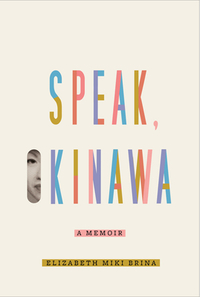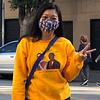Take a photo of a barcode or cover
Part memoir, part history of Okinawa. Brina writes about her journey to make peace with her heritage and form a stronger bond with her mom. Growing up, Brina rejects her mother and her weakness. Throughout the book, Brina unravels her self loathing and comes to understand that her mother has a different kind of strength that she didn’t see as a child.
This book made my heart ache for her mother, my mother, and all immigrants who come to this country, looking for a better life, and only finding isolation and hardship. It also made me understand a bit more about myself and my relationship with my parents.
The writing is simple and easy to understand, but the format and structure of the chapters could have been organized better.
This book made my heart ache for her mother, my mother, and all immigrants who come to this country, looking for a better life, and only finding isolation and hardship. It also made me understand a bit more about myself and my relationship with my parents.
The writing is simple and easy to understand, but the format and structure of the chapters could have been organized better.
emotional
reflective
medium-paced
this is one of the most intricate, deftly written memoirs I've ever read. it weaves the author's life with her account of her parents' lives and marriage and explores history, colonialism, diaspora, biracial identity, violence, addiction, indigeneity, poverty... wow. I will be thinking about this book for a long, long time.
This was a really excellent memoir that mixed Okinawan, Japanese, and American history with the author's own family story to create a compelling narrative about identity, race, belonging, and family. Most of the book is told in a very conversational style that makes it feel like the author is speaking to the reader (and Sachi Lovett's excellent narration heightens this effect). Other sections are told in the first person plural from the perspective of Okinawans recounting events in the history of their islands, and I found that the slightly experimental tone and structure of these sections worked brilliantly. My only criticism would be that the ending section, which is a departure from the main thread(s) of the memoir, jumps back and forth between time and perspectives a little too quickly - I felt it would have been more effective if it jumped back and forth a bit less.
dark
emotional
reflective
medium-paced
dark
reflective
sad
medium-paced
dark
emotional
medium-paced
slow-paced
Every once in awhile a book comes along that hits a very personal spot. SPEAK, OKINAWA was such a book and I’m not sure I’m going to be able to articulate all of my feelings but I’m going to try.
Elizabeth and I both have fathers who served in the military and met their wives overseas (hers in Okinawa, mine in Korea). Elizabeth and I both grew up in predominately white neighborhoods and experienced racism and micro aggressions. Elizabeth is biracial, and I’m adopted, but we both understand what it feels like to grow up hating apart of yourself, and not understanding why until later on in life. There were moments where it felt like she went into my brain and extracted my thoughts and feelings.
I felt seen. Elizabeth latched on to her white father and was cruel, as children can be, to her mother. Some of her behavior was awful, but I also had a very deep understanding of the why. I was able to read this book through the lens of that child, but also through the lens of a mother of my own biracial child, and that made this a very emotional read.
The reader also gets a very intimate look into the marriage between her mother and father. In the beginning, it felt like there was a clear good guy and bad guy. But as the story came to a close I felt like I really understood their marriage, their mutual respect for one another, and their love.
What I wasn’t expecting was getting a history lesson about Okinawa, which I found to be fascinating. I originally thought it was a city in Japan, not an island, and I had no idea about the contentious feelings towards the States. It blended seamlessly into Elizabeth’s narrative.
Elizabeth writes with poetic-like prose and it feels like you flit from thought to thought, memory to memory, but everything felt intentional and flowed. Much of this book isn’t necessarily happy but by the time you reach the end, you’re left with a sense of hope and joy. SPEAK, OKINAWA felt like one big apology to her mother, and was beautiful and is a must read.
Elizabeth and I both have fathers who served in the military and met their wives overseas (hers in Okinawa, mine in Korea). Elizabeth and I both grew up in predominately white neighborhoods and experienced racism and micro aggressions. Elizabeth is biracial, and I’m adopted, but we both understand what it feels like to grow up hating apart of yourself, and not understanding why until later on in life. There were moments where it felt like she went into my brain and extracted my thoughts and feelings.
I felt seen. Elizabeth latched on to her white father and was cruel, as children can be, to her mother. Some of her behavior was awful, but I also had a very deep understanding of the why. I was able to read this book through the lens of that child, but also through the lens of a mother of my own biracial child, and that made this a very emotional read.
The reader also gets a very intimate look into the marriage between her mother and father. In the beginning, it felt like there was a clear good guy and bad guy. But as the story came to a close I felt like I really understood their marriage, their mutual respect for one another, and their love.
What I wasn’t expecting was getting a history lesson about Okinawa, which I found to be fascinating. I originally thought it was a city in Japan, not an island, and I had no idea about the contentious feelings towards the States. It blended seamlessly into Elizabeth’s narrative.
Elizabeth writes with poetic-like prose and it feels like you flit from thought to thought, memory to memory, but everything felt intentional and flowed. Much of this book isn’t necessarily happy but by the time you reach the end, you’re left with a sense of hope and joy. SPEAK, OKINAWA felt like one big apology to her mother, and was beautiful and is a must read.




